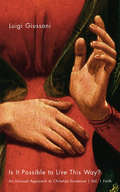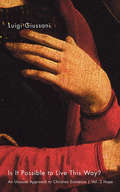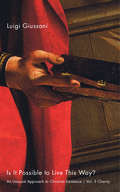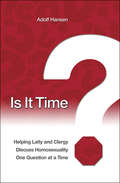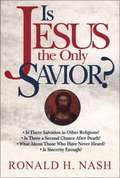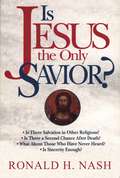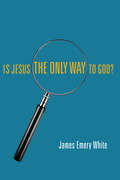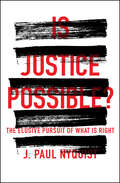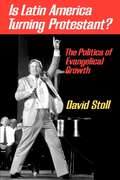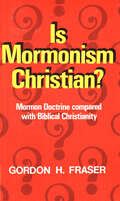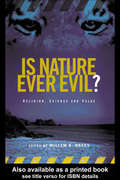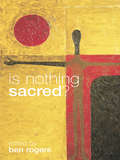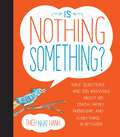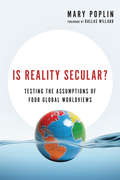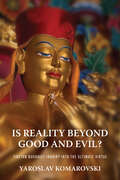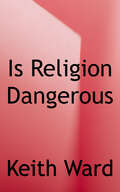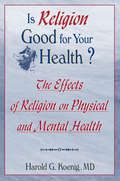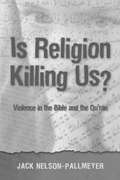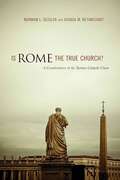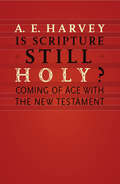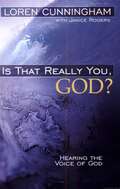- Table View
- List View
Is It Possible To Live This Way?
by Luigi GiussaniAs in all his works, Giussani encourages young people to be serious about their own existence and loyal to their experience. The conversations reported here are fascinating and insightful, providing support for a way of life that today is frequently questioned, rejected, or censured.
Is It Possible To Live This Way?
by Luigi GiussaniIs It Possible to Live this Way, a translation of the first part of Luigi Giussani's Si Può Vivere Così?, addresses the virtue of hope. A compilation of Giussani's conversations with young people who have chosen the path of the consecrated life in the Church - that is, have chosen to live their lives in the world according to the "evangelical counsels" of poverty, chastity, and obedience - it proposes an unusual yet reasonable approach to living as a Christian. As in all his works, Giussani encourages young people to be serious about their own existence and loyal to their experience. The conversations reported here are fascinating and insightful, providing support for a way of life that today is frequently questioned, rejected, or censured.
Is It Possible To Live This Way?: An Unusual Approach to Christian Existence: Charity
by Luigi Giussani John ZucchiThis volume of Is It Possible to Live this Way, a translation of Luigi Giussani's Si Può Vivere Così?, addresses the virtue of charity. A compilation of Giussani's conversations with young people who have chosen the path of the consecrated life in the Church - that is, have chosen to live their lives in the world according to the "evangelical counsels" of poverty, chastity, and obedience - it proposes an unusual yet reasonable approach to living as a Christian. As in all his works, Giussani encourages young people to be serious about their own existence and loyal to their experience. The conversations reported here are fascinating and insightful, providing support for a way of life that today is frequently questioned, rejected, or censured.
Is It Possible To Live This Way?: An Unusual Approach to Christian Existence: Faith
by Luigi GiussaniAs in all his works, Giussani encourages young people to be serious about their own existence and loyal to their experience. The conversations reported here are fascinating and insightful, providing support for a way of life that today is frequently questioned, rejected, or censured.
Is It Possible To Live This Way?: An Unusual Approach to Christian Existence: Hope
by Luigi GiussaniIs It Possible to Live this Way, a translation of the first part of Luigi Giussani's Si Può Vivere Così?, addresses the virtue of hope. A compilation of Giussani's conversations with young people who have chosen the path of the consecrated life in the Church - that is, have chosen to live their lives in the world according to the "evangelical counsels" of poverty, chastity, and obedience - it proposes an unusual yet reasonable approach to living as a Christian. As in all his works, Giussani encourages young people to be serious about their own existence and loyal to their experience. The conversations reported here are fascinating and insightful, providing support for a way of life that today is frequently questioned, rejected, or censured.
Is It Time?: Helping Laity and Clergy Discuss Homosexuality One Question at a Time
by Adolf HansenConversations about human sexuality are taking place all over The United Methodist Church--in local congregations, among leaders, and in conferences. Adolf Hansen, an ordained elder who is theologian-in-residence at St. Luke’s UMC, Indianapolis, contributes to this conversation by presenting questions for laity and clergy to explore as they engage in open dialogue in an atmosphere of mutual respect, even when the conversation partners disagree. The author says, "My hope is that persons who read this book will become aware of the wide variety of issues related to the subject of homosexuality; will be encouraged to reflect on each of them; will think through the meaning of whatever answers they give to the questions the book raises; will grapple with the implications of the stances they take; and will engage in conversations with others—both in a one-on-one setting and in a group." (from the Introduction)When we do that, he argues, we can move on to the wider issues and give our full attention to the mission of the Church: to make disciples of Jesus Christ for the transformation of the world. From the Faultlines collection, resources intended to inform conversations around human sexuality and the church.
Is Jesus The Only Savior?
by Ronald H. NashToday many question the idea that there is only one way to heaven (or that Christianity is the only true faith) -- even some people who identify themselves as Christians. In a world where we are likely to have neighbors of differing faiths, to profess Jesus as the only Savior may be viewed as arrogance and intolerance. Religious 'pluralism' is gaining popularity. Ronald Nash believes that one's position on the issue is crucial to an understanding of the Christian faith and sees pluralism as a significant threat to Christianity. He explores the divergent views of pluralism ('No') and inclusivism ('Yes, but') and makes a case for exclusivism (Yes, period'). In doing so, Nash especially confronts the pluralism of John Hick and the inclusivism of Clark Pinnock and John Sanders. He presents his case compellingly, in accessible terms and a readable style.
Is Jesus the Only Savior?
by Ronald H. NashToday many question the idea that there is only one way to heaven (or that Christianity is the only true faith) -- even some people who identify themselves as Christians. In a world where we are likely to have neighbors of differing faiths, to profess Jesus as the only Savior may be viewed as arrogance and intolerance. Religious "pluralism" is gaining popularity. Ronald Nash believes that one's position on the issue is crucial to an understanding of the Christian faith and sees pluralism as a significant threat to Christianity. He explores the divergent views of pluralism ("No") and inclusivism ("Yes, but") and makes a case for exclusivism (Yes, period"). In doing so, Nash especially confronts the pluralism of John Hick and the inclusivism of Clark Pinnock and John Sanders. He presents his case compellingly, in accessible terms and a readable style.
Is Jesus the Only Way to God? (IVP Booklets)
by James Emery WhiteIsn't it awfully narrow and intolerant for Christians to believe that Jesus is the only way to God? James Emery White responds to common questions.
Is Justice Possible?: The Elusive Pursuit of What is Right
by J. Paul Nyquist"Christians who take the Bible seriously dare not ignore this message. Paul Nyquist writes like an Old Testament prophet in modern America . . . &” — Leith Anderson, president, National Association of Evangelicals | Washington, DC&“Paul Nyquist brings a biblical focus and discerning look at why justice matters and how we might worktoward it.&”- Ed Stetzer, Billy Graham Chair | Wheaton College&“… [Explains] why justice often eludes us in this life, but also how we must work to achieve it as best we can.&”— Dr. Erwin W. Lutzer, pastor emeritus, The Moody Church | Chicago Why is justice so hard to come by?The innocent are convicted. The guilty get away. The scales tip toward the powerful, while the weak remain oppressed. If our world is so sophisticated, why is there so much injustice? What can believers do? Can we ever expect justice? Dr. Paul Nyquist, former president of Moody Bible Institute, addresses these questions and more in his new book, Is Justice Possible? In four parts he considers:Biblical and theological foundations of justice Obstacles to justice in human societyPractical steps for pursuing justice in political, personal, and public arenasThe hope of true justice upon Christ&’s returnAs police shootings and wrongful incarcerations raise increasing questions in the minds of Christians, Is Justice Possible? will seek to provide answers and establish biblical expectations.At its core, this is a book about an attribute of God. Rather than rely on our own ideas of justice, we must look to the One who made us and embodies justice perfectly. Only then can we pursue justice in purposeful, effective, eternal ways.
Is Justice Possible?: The Elusive Pursuit of What is Right
by J. Paul Nyquist"Christians who take the Bible seriously dare not ignore this message. Paul Nyquist writes like an Old Testament prophet in modern America . . . &” — Leith Anderson, president, National Association of Evangelicals | Washington, DC&“Paul Nyquist brings a biblical focus and discerning look at why justice matters and how we might worktoward it.&”- Ed Stetzer, Billy Graham Chair | Wheaton College&“… [Explains] why justice often eludes us in this life, but also how we must work to achieve it as best we can.&”— Dr. Erwin W. Lutzer, pastor emeritus, The Moody Church | Chicago Why is justice so hard to come by?The innocent are convicted. The guilty get away. The scales tip toward the powerful, while the weak remain oppressed. If our world is so sophisticated, why is there so much injustice? What can believers do? Can we ever expect justice? Dr. Paul Nyquist, former president of Moody Bible Institute, addresses these questions and more in his new book, Is Justice Possible? In four parts he considers:Biblical and theological foundations of justice Obstacles to justice in human societyPractical steps for pursuing justice in political, personal, and public arenasThe hope of true justice upon Christ&’s returnAs police shootings and wrongful incarcerations raise increasing questions in the minds of Christians, Is Justice Possible? will seek to provide answers and establish biblical expectations.At its core, this is a book about an attribute of God. Rather than rely on our own ideas of justice, we must look to the One who made us and embodies justice perfectly. Only then can we pursue justice in purposeful, effective, eternal ways.
Is Latin America Turning Protestant?: The Politics of Evangelical Growth
by David StollProtestants are making phenomenal gains in Latin America. This is the first general account of the evangelical challenge to Catholic predominance, with special attention to the collision with liberation theology in Central America. David Stoll reinterprets the "invasion of the sects" as an evangelical awakening, part of a wider religious reformation which could redefine the basis of Latin American politics.
Is Mormonism Christian?: Mormon Doctrine compared with Biblical Christianity
by Gordon H. FraserHave you ever wondered how to respond to Mormon missionaries at your door? Are you curious about the history of Mormonism? Do some of their doctrines sound either offensive or attractive? Have you asked yourself, &“Well, now, is Mormonism Christian?&” Dr. Gordon H. Fraser has compiled significant answers to these questions. He discusses what those missionaries at your door mean by the words they use and how to most simply and effectively witness to your own faith. Is Mormonism Christian? covers much of the doctrine, practice, and teaching of the Church of Jesus Christ of Latter-Day Saints and gives an outline of its history. Here is a penetrating analysis of a group known by many but understood by few.
Is Mormonism Christian?: Mormon Doctrine compared with Biblical Christianity
by Gordon H. FraserHave you ever wondered how to respond to Mormon missionaries at your door? Are you curious about the history of Mormonism? Do some of their doctrines sound either offensive or attractive? Have you asked yourself, &“Well, now, is Mormonism Christian?&” Dr. Gordon H. Fraser has compiled significant answers to these questions. He discusses what those missionaries at your door mean by the words they use and how to most simply and effectively witness to your own faith. Is Mormonism Christian? covers much of the doctrine, practice, and teaching of the Church of Jesus Christ of Latter-Day Saints and gives an outline of its history. Here is a penetrating analysis of a group known by many but understood by few.
Is Nature Ever Evil?: Religion, Science and Value
by Willem B. DreesCan nature be evil, or ugly, or wrong? Can we apply moral value to nature?From a compellingly original premise, under the auspices of major thinkers including Mary Midgley, Philip Hefner, Arnold Benz and Keith Ward, Is Nature Ever Evil? examines the value-structure of our cosmos and of the science that seeks to describe it. Science, says editor Willem B. Drees, claims to leave moral questions to aesthetic and religious theory. But the supposed neutrality of the scientific view masks a host of moral assumptions. How does an ethically transparent science arrive at concepts of a 'hostile' universe or a 'selfish' gene? How do botanists, zoologists, cosmologists and geologists respond to the beauty of the universe they study, reliant as it is upon catastrophe, savagery, power and extinction? Then there are various ways in which science seeks to alter and improve nature. What do prosthetics and gene technology, cyborgs and dairy cows say about our appreciation of nature itself? Surely science, in common with philosophy, magic and religion, can aid our understanding of evil in nature - whether as natural catasrophe, disease, predatory cruelty or mere cosmic indifference?Focusing on the ethical evaluation of nature itself, Is Nature Ever Evil? re-ignites crucial questions of hope, responsibility, and possibility in nature.
Is Nothing Sacred?
by Ben RogersWe call many things sacred, from cows, churches and paintings to flags and burial grounds. Is it still meaningful to talk of things being sacred, or is the idea merely a relic of a bygone religious age? Does everything - and every life - have its price? Is Nothing Sacred? is a stimulating and wide-ranging debate about some of the major moral dilemmas facing us today, such as the value of human life, art, the environment, and personal freedom. Packed with clearly presented controversial issues, we are asked to decide whether we should revere life when someone chooses to die, preserve the giant California redwoods, cherish Vermeer's originals for their own sake, or curtail personal freedom for the greater good. Ronald Dworkin argues that the concept of the scared is essential to any human ethics, and Simon Blackburn explains why he thinks 'a humanist should not feel guilty at the emotions of awe and reverence that can be inspired by great religious works of art. Throughout, the idea of the sacred in a secular age is hotly debated amongst the authors and put to the test: should it be abandoned altogether, or does it still have something to teach us?Is Nothing Sacred? brings together outstanding philosophers and thinkers, including Suzanne Uniacke, Michael Clark, Alan Holland, Simon Blackburn, Richard Dawkins, Richard Norman, Alan Howarth, Nigel Warburton, Matthew Kieran and John Harris.
Is Nothing Something?: Kids' Questions and Zen Answers About Life, Death, Family, Friendship, and Every thing in Between
by Thich Nhat HanhIn Is Nothing Something? Zen Master Thich Nhat Hanh answers heartfelt, difficult, and funny questions from children of all ages. Illustrated with original full-color artwork by Jessica McClure, Is Nothing Something? will help adults plant the seeds of mindfulness in the young children in their lives. Beginning with the most basic questions, "What is important in life?" and "Why is my brother mean to me?" and progressing through issues that we all wrestle with, such as "How do I know if I really love somebody?", "How long am I going to live?", and "What does God look like?", each page presents a question with a short answer from Thich Nhat Hanh, appropriate for beginning readers to work with on their own. The back of the book has the first complete children’s biography of Thich Nhat Hanh, along with basic, kid-friendly instructions for mindful breathing and mindful walking. Both humorous and profound, Is Nothing Something? is the perfect resource for kids with questions, adults looking to answer them, and anyone with questions of their own.
Is Reality Secular?: Testing the Assumptions of Four Global Worldviews (Veritas Books)
by Mary PoplinWhat is the nature of reality? At the root of our society's deepest political and cultural divisions are the conflicting principles of four global worldviews. While each of us holds to some version of one of these worldviews, we are often unconscious of their differences as well as their underlying assumptions. Mary Poplin argues that the ultimate test of a worldview, philosophy or ideology is whether it corresponds with reality. Since different perspectives conflict with each other, how do we make sense of the differences? And if a worldview system accurately reflects reality, what implications does that have for our thinking and living? In this wide-ranging and perceptive study, Poplin examines four major worldviews: naturalism, humanism, pantheism and Judeo-Christian theism. She explores the fundamental assumptions of each, pressing for limitations. Ultimately she puts each perspective to the test, asking, what if this worldview is true? If reality is secular, that means something for how we orient our lives. But if reality is not best explained by secular perspectives, that would mean something quite different. Consider for yourself what is the fundamental substance of reality.
Is Reality beyond Good and Evil?: Tibetan Buddhist Inquiry into the Ultimate Virtue (Traditions and Transformations in Tibetan Buddhism)
by Yaroslav KomarovskiIlluminates the debate on the nature of virtue and ultimate reality Tibetan Buddhist thinkers agree that, on the most fundamental level, our nature is pure. What exactly that ultimate nature is, however, remains the subject of debate. Yaroslav Komarovski&’s new book appraises how divergent understandings of the ultimate nature by Tibetan thinkers, including ideas informed by two conflicting yet complementary systems of Buddhist thought—Yogācāra and Madhyamaka—affect their diverse approaches to understanding virtue, and how their understandings of virtue in turn relate to their approaches to the Buddhist thought and practice. Tracing the origins of the polemics on ultimate virtue back to the Indian texts and writings of early Tibetan thinkers, Komarovski focuses chiefly on the works of the two seminal thinkers of the Sakya tradition of Tibetan Buddhism, Serdok Penchen Shakya Chokden (1428–1507) and Gowo Rapjampa Sönam Senggé (1429–1489), and offers both a learned summary of a historical controversy and a modern commentary on this vital debate.
Is Religion Dangerous?
by Keith WardMany commentators today claim that religion is dangerous and harmful. In addressing this question, Keith Ward begins by defining what religion actually is and how most human harm has been caused. He then looks at why people say that religion is dangerous, focusing particularly on religious wars and conflicts and on specific attacks on religion, such as the claims that God is wrathful, that religion is intolerant, that religious morality is primitive and cruel. <p><p>Keith Ward argues that religion produces great good - for example, in terms of hospitals, the abolition of slavery, great art and music, moral heroism, and philosophy and science. Religion, he concludes, is the best rational basis for morality.
Is Religion Good for Your Health?: The Effects of Religion on Physical and Mental Health
by Harold G KoenigIs Religion Good for Your Health? takes you deep into the heart of the ageless debate on the importance of religion and faith to physical and mental health. On the one hand, you will learn about important research findings from cross-sectional, longitudinal, and intervention studies that have demonstrated positive effects of religious belief on both mental and physical health. On the other hand, you will learn how the vast clinical experiences of leading health experts suggest that religion can have negative effects on health. Integral to the book’s exploration of the relationship between health and religion are the trends that have occurred in society over the last century. You will learn about significant demographic changes, changes in health and health care, and shifts in values, attitudes, and religious conviction, all of which have direct implications for health care providers, the clergy, the “baby boomers,” and older adults. From Author Harold Koenig, a leading expert on religion and health who has frequently been interviewed by major broadcasting networks such as ABC, National Public Radio, the British Broadcasting Corporation, NBC, CBS, and “Ivanhoe Broadcast News,” you will also learn about: pathological uses of religion the need for cooperation and collaboration between health and religious professionals studies on the relationship of religious beliefs and practice to physical conditions such as blood pressure, heart disease, stroke, and cancer links between religious behavior and depression, anxiety, and drug use the waning of religion’s influence in America first-hand accounts from patients who have faced painful and/or life-threatening illnessAs Is Religion Good for Your Health? analyzes the pathological aspects of religion, you will begin to understand how religious beliefs have the capacity to strongly influence people’s lives and their health, whether positively or negatively. Health care providers, public policy experts, religious professionals, medical researchers, and medical students will find the book’s overview of the issues at stake, particularly the implications for our public health care system, crucial to the advancement of health care practice into the next century.
Is Religion Killing Us?: Violence in the Bible and the Quran
by Jack Nelson-PallmeyerNelson-Pallmeyer explores the ways in which the sacred texts of Christianity, Judaism, and Islam seemingly justify violence against enemies in the service of God's will. He challenges the understanding of power that lies at the heart of the Bible and the Quran, arguing that nonviolence is crucial to the future of humanity and that the abusive visions of power presented in sacred texts should be challenged.
Is Rome the True Church?: A Consideration of the Roman Catholic Claim
by Norman L. Geisler Joshua M. BetancourtA major critical analysis of the Roman Catholic Church's exclusive claim of infallibility. In 2007 the president of the Evangelical Theological Society converted to Roman Catholicism. His conversion and subsequent resignation stirred up questions that always swirl around such high-profile conversions: Why do some Protestants become Catholics? Is Roman Catholicism a false church? Which church is the true church? Norman Geisler and Joshua Betancourt answer these questions in Is Rome the True Church?, a major critical analysis of the Roman church's claim to being the only true church. Since this claim is the most fundamental of all Catholic dogmas-all other doctrines being based on it-the whole of the Roman system stands or falls here. The authors explain and critique the Roman church's biblical, historical, theological, and philosophical arguments on behalf of its claim, digging into the best primary and secondary Catholic sources on the subject. This book has answers for students, thoughtful evangelicals, and anyone interested in Roman Catholicism.
Is Scripture Still Holy?: Coming of Age with the New Testament
by A. E. HarveyIn this volume A. E. Harvey asks, Is the notion of "Holy Scripture" still credible? In particular, in the light of modern critical study and postmodern literary theory, does the New Testament still qualify as a "holy" book? Arguing that the New Testament must continually subject its credentials to examination for historical reliability, internal consistency, and general plausibility, Harvey tests the Bible's historical credibility and plausibility in seven concise chapters. In dialogue with historical criticism, he compares the New Testament to other ancient documents, examines its presentation of Jesus, and considers the New Testament's validity as a moral guide in the twenty-first century. Harvey's careful examination leads him to conclude that a good case can still be made for the New Testament's authority and "holiness," subject to continual reassessment in the light of further advances in understanding and criticism.
Is That Really You, God?: Hearing the Voice of God
by Loren Cunningham Janice RogersThis practical guide to hearing God's voice shows how an ordinary man who was committed to hearing God and obeying Him became the founder of the largest interdenominational missions organization in the world. <p><p> Loren Cunningham's dream began with a vision - waves of young people moving out across the continents announcing the Good News of Jesus Christ to the whole earth. Decades later, Loren's vision has grown into an interdenominational movement of Christians from around the world who are dedicated to presenting the Gospel to this generation. <p><p> How did God move Loren's dream from vision to reality? He led Loren and his wife, Darlene, through a series of tough lessons in guidance. The exciting story of Youth With A Mission has much to teach us about the art of listening to God as we seek to be used by Him. Is That Really You, God? is not only a practical guide to hearing God's voice, but also an amazing testimony to how following His direction can impact our lives and our world for the glory of God's kingdom. <p><p> International statesman and conference speaker Loren Cunningham and his wife, Darlene, are the founders of Youth With A Mission. They currently live at the YWAM University of the Nations center in Kona, Hawaii. Loren speaks and teaches internationally. His extensive missionary travels have taken him to every country on earth. Pages: 203 (paperback)
